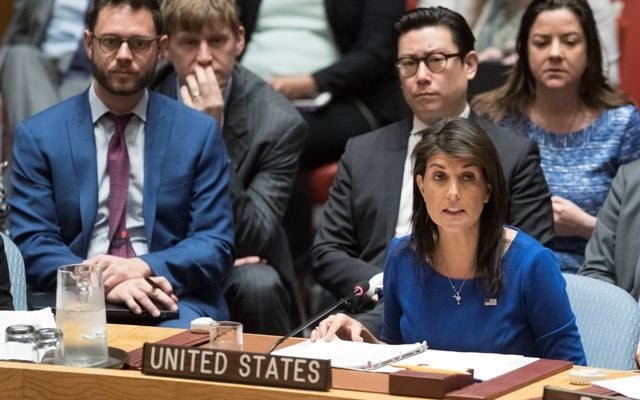“The international community will not allow chemical weapons to come back into our everyday life,” said Haley while announcing new sanctions on Russia for enabling Syria.
By: AP and World Israel News Staff
President Donald Trump’s aides on Sunday stressed continuing US troop involvement in Syria and plans for new economic sanctions against Russia for enabling the government of Bashar Assad.
Stepping up the pressure on Syria’s president, US Ambassador to the United Nations (UN) Nikki Haley indicated the sanctions to be announced Monday would be aimed at sending a message to Russia, which she said has blocked six attempts by the UN Security Council (UNSC) to make it easier to investigate the use of chemical weapons.
“Everyone is going to feel it at this point,” Haley said, warning of consequences for Assad’s foreign allies.
“The international community will not allow chemical weapons to come back into our everyday life,” she said. “The fact he was making this more normal and that Russia was covering this up, all that has got to stop.”
US, French and British warplanes and ships on Saturday launched more than 100 missiles nearly unopposed by Syrian air defenses. However, the Pentagon said the pummeling of three chemical-related facilities left enough others intact to enable the Assad government to use banned weapons against civilians if it chooses.
US involvement in Syria ‘not done’
Haley made clear the US won’t be pulling troops out of Syria right away, saying US involvement there “is not done.”
Haley said the three US goals for accomplishing its mission in Syria are making sure chemical weapons are not used in a way that could harm US national interests, defeating the Islamic State (ISIS) terror group and having a good vantage point to watch what Iran is doing.
“We’re not going to leave until we know we’ve accomplished those things,” she said.
Haley said the joint military strike “put a heavy blow into their chemical weapons program, setting them back years” and reiterated that if Assad uses poison gas again, “the United States is locked and loaded.”
The nighttime assault on Syria was carefully limited to minimize civilian casualties and avoid direct conflict with Russia.
Russia has military forces, including air defenses, in several areas of Syria to support Assad in his long war against anti-government rebels.
Russia and Iran called the use of force by the United States and its French and British allies a “military crime” and “act of aggression.” The UN Security Council rejected a Russian resolution calling for condemnation of the “aggression” by the three Western allies.
Assad denies he has used chemical weapons, and the Trump administration has yet to present hard evidence of what it says precipitated the allied missiles attack: a chlorine gas attack on civilians in Douma on April 7. The US says it suspects that sarin gas also was used.
Successfully hit every target
The strikes “successfully hit every target,” said Dana W. White, the chief Pentagon spokeswoman. The military said there were three targets: the Barzah chemical weapons research and development site in the Damascus area, a chemical weapons storage facility near Homs and a chemical weapons “bunker” a few miles from the second target.
Although officials said the singular target was Assad’s chemical weapons capability, his air force, including helicopters he allegedly has used to drop chemical weapons on civilians, were spared. In a US military action a year ago in response to a sarin gas attack, missiles took out nearly 20 percent of the Syrian air force, the Pentagon said.
The US-led operation won broad Western support. The NATO alliance gave its full backing; NATO Secretary-General Jens Stoltenberg said the attack was about ensuring that chemical weapons cannot be used with impunity.
In his televised address from the White House on Friday, Trump said the US was prepared to keep up the economic, diplomatic and military pressure on Assad until he ends a pattern of killing his own people with internationally banned chemical weapons.
That did not mean, however, that military strikes would continue. In fact, Gen. Joseph Dunford, chairman of the Joint Chiefs of Staff, said no additional attacks were currently planned.





